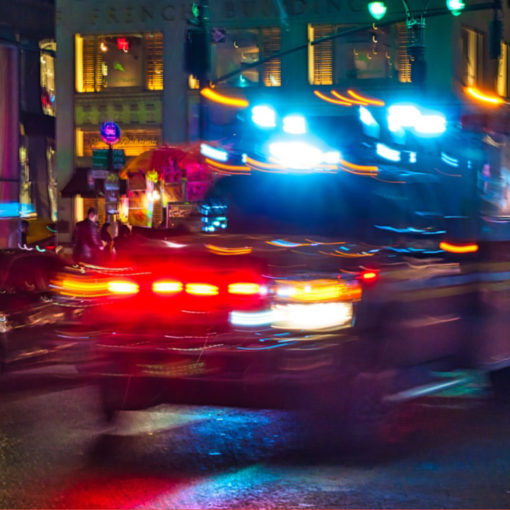by Hal Newman
It’s been a long while since this happened however it seems the story continues to have a serious impact on those with whom it’s shared.
And that’s interesting in and of itself in that several colleagues have approached me recently because they’ve heard this story presented at conferences by folks other than me claiming it as their own.
Except, of course, for the part where the presenters accept responsibility for making fateful decisions because in their telling of my story this happened to ‘someone they know’ or ‘an unnamed colleague’ and they proceed to dis’ him for his lack of knowledge about their community.
I was actually very familiar with the community I served.
I was the director of Cote Saint-Luc EMS in January of 1998. The City of Cote Saint-Luc was an interesting place to lead a team of emergency medical services providers. There was a very high percentage of the population who were 65 years of age and older and embedded within that considerable slice was a large community of Holocaust survivors.
Our EMS department was innovative in its outreach efforts and in its expanded scope of service that made it more of a psycho-social service than a purely emergency medical services organization.
On January 5 the freezing rain storm began to take a toll on the power grid. At 05h00 on the morning of January 6th, dispatch began to become inundated with calls for assistance. There were reports from Hydro-Quebec that some 700,000 households were without power in a large swath of southern Quebec.
On January 6 we realized evacuations were likely to become a necessity. At 11h35 we received the first of what would be many calls for medical verifications. A 75-year-old man was on a home oxygen system and plans were made for his eventual evacuation.
We were sliding further into crisis. Our calls were multiplying while available resources were shrinking. People were finding it difficult if not impossible to find a hotel room anywhere in Montreal.
From crisis we went directly into the abyss. No need to pass Go. I called for assistance from the provincial government to assist with establishing shelters for the thousands of senior citizens and medically fragile residents we were evacuating from dark, frigid, carbon-monoxide-intensive apartment buildings.
You could not measure the depth of my despair when I realized no help was coming. That feeling of profound isolation was almost immediately replaced by the realization that we would have to take care of ourselves – no cavalry would be riding over the hill to come to our rescue.
On January 7 at 10h42 our crews began the assessment of a 10-floor seniors residence. At 10h46 the transport of the first 16 evacuees from the building begins. They taken to a shelter established at City Hall. The fire department is called to the scene to ventilate the building after fumes from the emergency generators circulate throughout the hallways.
On January 8, Hydro Quebec reported 950,000 households are without power.
I made mistakes.
We had many senior-centric highrise or multi-building facilities that had to be evacuated. Given the sheer number of evacuations and the limited humans available to carry out the task, we drafted police officers to assist with these mass evacuations.
As police officers, many in tactical or bulked-up gear due to the extreme weather conditions, went door-to-door in the darkened hallways, hundreds of Holocaust survivors flashed back to a time of forced evacuations and transport to the death camps.
When bubbies and zaidies* scream.
We had, of course, unintentionally made matters worse by providing the police officers with instructions to residents to gather their essentials into a bag as quickly as possible and then make their way to the lobby where they would be loaded into buses for the ride to the shelters.
At the shelters we had the standard line-up check-in procedure. The first round of evacuations resulted in dozens of cases of severe mental trauma and more than a few syncopal episodes.
When the plans failed, we adjusted.
We adjusted by having our medics accompany the police officers on their evacuation rounds, softened the approach, used as much light as could be hauled around, brought social workers into the mix on the buses and altered the check-in procedure to include large round tables where a social worker and a medic were assigned to each table to help residents acclimate to their new surroundings.
It became more like a last-minute social gathering. Thank goodness.
On January 10th, Hydro Quebec reported 1.4 million households without power. Water had to be boiled prior to consumption.
On January 11th, the army arrived with more than 11,000 soldiers on the ground. The Abbruzzesse Family had power in their kitchen in Montreal North. Huge trays of wonderful Italian dishes were transported across the city to feed our crews. Smaller army. Just as appreciated.
I remember a satellite phone conversation with someone at an agency considering lending us a hand during the disaster. We were evacuating another 100 or so seniors from a nursing home at the time. The gentleman on the phone said they might be willing to send someone to better assess the gravity of the situation. Right at that moment a large piece of ice dropped off the top of a 20-floor building and hit a parked car on the street behind me. There was a large crash. The man on the phone exclaimed, ‘What was that?!’
My reply, ‘Hell just froze over, sir.’
Be well. Practice big medicine.
Hal
*Bubby and Zaidie are the yiddush words for Grandmother and Grandfather respectively.



